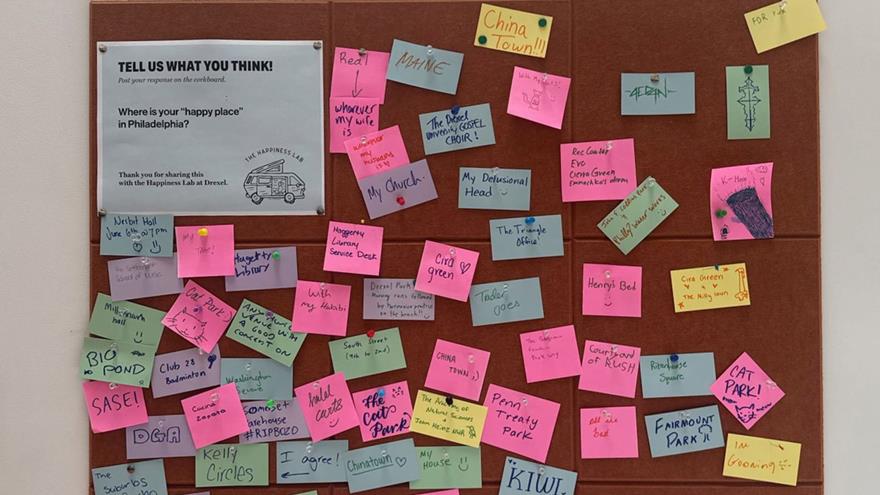Drexel Culinary Students Learn From Famed Chef Marc Vetri

“We’re here for you. Think about things while you’re making them and ask a lot of questions,” Chef Marc Vetri recently said to 11 Drexel culinary arts students during his course, the Center for Hospitality and Sports Management’s CULA 400: “Directed Studies With a Master Chef.”
Vetri, a James Beard Award-winning renowned local chef, restaurateur, cookbook author and philanthropist, that day had brought in a “visiting professor” to work with the class: Jeff Michaud, another James Beard Award winner and the executive chef and co-owner of Vetri family restaurants Osteria and Amis. Michaud nodded in agreement with Vetri’s statement.
While the students worked to prepare recipes from Michaud’s “Eating Italy" cookbook/memoir, like veal tartare with shaved artichoke, crispy sweetbread with parmigiana fondue and a zabaione dessert, the two professional chefs walked around the kitchen to give advice and offer tips and techniques. And the teachers got their hands dirty, too, whether by demonstrating how to butcher a rabbit or advising students on ingredients and methods.
It’s quite the opportunity for Drexel students: Not many aspiring chefs get to learn alongside one of the leading experts in Italian cuisine, but these culinary arts students do that once a week.
These students are getting more than what Vetri expressed in a 2012 Huffington Post article giving advice to young chefs. Now, the Drexel alum is personally working with Drexel’s culinary students to teach about food, the food industry and the skills they’ll need outside of the classroom — or in this case, the fully operational kitchen on the sixth floor of the Paul Peck Problem Solving and Research Center.
“He genuinely has interest in us as students. He has just as much interest in the ingredients that he uses and the history behind them as he does actually cooking the food,” said David Klein, a senior culinary arts student and entrepreneurship minor.
Vetri received a bachelor’s degree in marketing and finance from Drexel’s LeBow College of Business in 1990. After graduation, he learned his craft in New York and Italy before opening his first restaurant, Vetri, in 1998. He later opened two branches of Osteria, Alla Spina, Amis and Pizzeria Vetri, and will open his latest, Lo Spiedo, sometime this year.
Though he’s taught classes at his restaurants before, Vetri is not a typical professor, which means his class is not a typical class. Each week focuses on an essential dish or ingredient that students should know how to master, but he also discusses its history and why it’s important.
“When you’re learning from the best, everything is something you can learn to do,” said Asha-Le Davis, an undergraduate culinary arts student.
There’s a lot to learn. Entire four-hour classes have been devoted to just one ingredient, and the students still eat it up.
“We had a whole class on risotto, and half of that class was dedicated just to the rice. Vetri visited the Acquerello Rice farm in Italy, and was so happy to share his experience with us. He talked to us about why he loves their rice, showed us a video on how they grow it and showed us physical examples of the rice in different stages of the growing and aging process,” Klein said.
After Vetri goes over the “history” and “culture” lessons, then it’s time to get cooking. Students often work in groups and focus on cooking one dish — without using recipes. At the end of each class, the students sample the finished products, often in a multi-course meal. Surprisingly, though, the food isn’t the best part of the class — and that’s why the students signed up for the course.
“Who would pass up an opportunity to learn in a one-on-one setting with one of the best chefs in the entire country, maybe even the world?” said Klein, who has worked at acclaimed Main Line restaurant Citron and Rose for over a year.
It’s not just one chef that the students have learned from, either. Vetri’s course includes a lineup of “visiting professors” in addition to Michaud, including Adam Leonti, chef de cuisine at Vetri Ristorante, who will demonstrate bread- and macaron-making techniques, and Brad Spence, a chef and partner at Amis who showed students how to butcher three whole lambs.
“We made 10 different dishes including lamb tartare, meatballs with seasoned yogurt and herbs, rigatoni with lamb Bolognese, loin chops, whole roasted leg and fried spare ribs,” Klein said. “It was literally the most amazing meal I’ve ever had in my life, and we made all of it together. The funny thing is I don’t even like lamb too much — not until now, at least.”
When Vetri created the syllabus, he didn’t limit the focus to the kitchen classroom. He planned for “field trips” to the Samuels and Son seafood distributor, and a similar restaurant supplier trip will be made to Green Meadow Farm in Gap, Pa.
This marks Vetri’s first time teaching at Drexel, though he did host an informal pasta-making session for Drexel culinary students at Osteria over the summer. After this first batch of classes and students, he says he might come back and make the course a yearly occurrence.
“Drexel has been proud to call Chef Marc Vetri an alumnus, business leader, author and philanthropist, and I'm so proud we can add Center for Hospitality and Sport Management faculty member to that impressive list," said center director Jonathan Deutsch, PhD.
In This Article
Drexel News is produced by
University Marketing and Communications.

